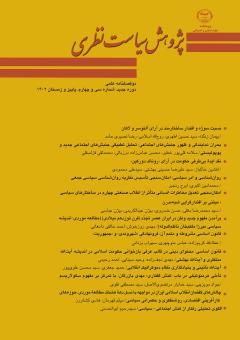قانون اساسی مشروطه و متمم آن: فرونهادگیِ «شهروندی» و «جمهوریت»
محورهای موضوعی : پژوهش سیاست نظری
عطاءالله کریم زاده
1
,
عباس منوچهری
2
![]() ,
سهراب یزدانی
3
,
سهراب یزدانی
3
1 - دانشجوی دکتری اندیشههای سیاسی، دانشگاه تربیت مدرس، ایران
2 - استاد علوم سياسي دانشگاه تربيت مدرس، ایران
3 - دانشیار بازنشسته گروه تاریخ، دانشگاه خوارزمی، ایران
کلید واژه: شهروندی, جمهوریت, مشروطه, قانون اساسی و متمم,
چکیده مقاله :
دورۀ مشروطه، مهمترین دورۀ تاریخ معاصر ایران در ارتباط با مدرنیته محسوب میشود. در فضای مشروطه، دنیای غرب تنها در تحولات مادی و فناورانۀ آن نگریسته نمیشد، بلکه به ایدهها و اندیشههای مدرن در اشکال گوناگون فکری، سیاسی و اجتماعی آن توجه میشد. در این ارتباط، هرچند در متن قانون اساسی مشروطه و متمم آن از دو مفهوم «شهروندی» و «جمهوریت» استفاده نشده است، این به معنای فقدان فهمی از آنها نزد مشروطهخواهان نبود. با وجود این دو سنت تاریخیِ ایران یعنی «شرع» و «سلطنت» در جدال با مفاهیم جدید و دفاع از موجودیت خود بودند و در متن قانون اساسی مشروطه و متمم آن تلاش کردند که نفوذ و قدرت خود را با حقوقی کردن و به رسمیت بخشیدن قانونی آن حفظ کنند. به همین خاطر، آنچه به وقوع پیوست، این بود که ایدههای «شهروندی» و «جمهوریت» که به معنی فرارَوی از رعیتبودگیِ مردم و قدرت یافتن آنها بود، در نتیجه تنش بین دو جریان فکری اصلی با ممانعت و تقلیلیافتگی مواجه شد و نهتنها در ساحت انضمامي نهادينه نشد، بلكه در ساحت نظري نيز رشد نيافت.
The Mashrooteh Constitution
and its Supplement: The Manifestation of “Citizenship” and “Republicanism”
Attaullah Karimzadeh*
Abbas Manouchehri**
Sohrab Yazdani***
The Constitutional (Mashrooteh) Period is considered the most important period in modern Iranian history concerning modernity. During this period, the Western world was not solely viewed in terms of its material and technological advancements but was also noted for its modern ideas and thoughts in various intellectual, political, and social forms. Although the concepts of "citizenship" and "republicanism" were not explicitly utilized in the text of the constitutional and its supplementary laws, this does not signify a lack of understanding of them among constitutionalists. Despite the historical traditions of "shari'a" and "monarchy" in Iran grappling with new concepts and defending their own existence, efforts were made within the constitutional and supplementary laws to preserve their influence and power by legalizing and institutionalizing them. Consequently, what transpired was the encounter of the ideas of "citizenship" and "republicanism," which meant emancipation from subjects' status and empowerment, leading to tension between the two main intellectual currents, resulting in resistance and diminishing reception. These concepts not only failed to institutionalize in the administrative realm but also did not develop substantially on a theoretical level.
Keywords: Citizenship, Republic, Mashroteh, Constitution, Supplement.
* Corresponding Author: Ph.D. Student of Political Thoughts, Tarbiat Modares University, Iran.
atakarimzadeh@yahoo.com
** Professor of Political Science, Tarbiat Modares University, Iran. Amanoocheri@yahoo.com
*** Retired Associate Professor, Department of History, Kharazmi University, Iran. yazdanis1948@gmail.com
